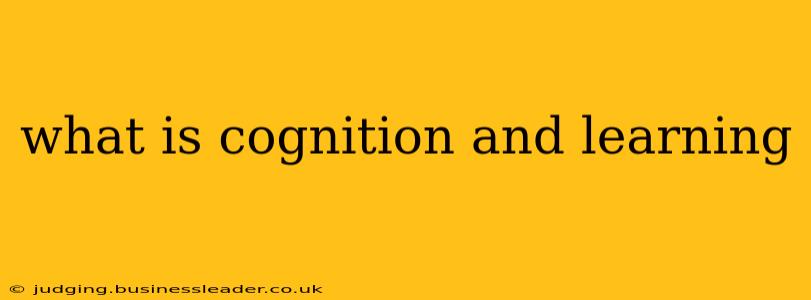Cognition and learning are deeply intertwined processes fundamental to how we understand and interact with the world. While distinct, they are inseparable in shaping our experiences and behaviors. This exploration delves into the nature of both, highlighting their relationship and impact on our lives.
What is Cognition?
Cognition encompasses the mental processes involved in acquiring knowledge and understanding through thought, experience, and the senses. It's the intricate machinery of our minds, encompassing a vast range of activities:
- Perception: How we interpret sensory information from our environment. This includes sight, sound, touch, taste, and smell, and how our brain organizes this information into meaningful experiences.
- Attention: The selective focusing of our conscious awareness on particular stimuli. Without attention, we'd be overwhelmed by the constant influx of sensory input.
- Memory: The encoding, storage, and retrieval of information. This includes short-term memory (holding information briefly) and long-term memory (storing information for extended periods). Different types of long-term memory exist, such as episodic (personal experiences) and semantic (facts and general knowledge).
- Language: Our capacity to communicate using symbols (words, signs, etc.). Language plays a crucial role in cognition, enabling us to share knowledge, express thoughts, and build complex social structures.
- Problem-solving: The process of identifying a problem, exploring potential solutions, and selecting the best approach. This often involves creativity, critical thinking, and decision-making.
- Reasoning: The process of drawing logical conclusions from information. This includes deductive reasoning (going from general principles to specific conclusions) and inductive reasoning (going from specific observations to general principles).
What is Learning?
Learning is the process of acquiring new knowledge, skills, behaviors, or values through experience, study, or being taught. It's a change in behavior or understanding that results from experience. Learning is not a passive process; it involves active engagement with information and the environment. Several key aspects characterize learning:
- Experience-driven: Learning relies heavily on our interactions with the world. Through trial and error, observation, and feedback, we adapt and refine our understanding.
- Adaptive: Learning enables us to adapt to changing circumstances. By acquiring new knowledge and skills, we can solve problems, achieve goals, and navigate complex situations.
- Goal-oriented: While not always consciously directed, learning often aims to achieve specific outcomes. We might learn to ride a bike, master a new language, or solve a complex equation, all driven by specific goals.
- Cumulative: Learning is a cumulative process; new knowledge and skills build upon what we already know.
How are Cognition and Learning Related?
Cognition and learning are intricately linked. Cognition provides the mental tools—perception, attention, memory, language—that enable us to learn. Learning, in turn, modifies and refines our cognitive abilities. We learn by actively using our cognitive processes. For example, we learn to read by using our visual perception, attention, memory, and language skills.
What are the different types of learning?
There are various types of learning, including:
- Associative learning: Learning through association, such as classical conditioning (Pavlov's dogs) and operant conditioning (rewards and punishments).
- Cognitive learning: Learning through understanding concepts, problem-solving, and decision-making. This often involves higher-order cognitive processes.
- Social learning: Learning through observation, imitation, and interaction with others. This is particularly important for social development and cultural transmission.
- Motor learning: Learning physical skills, such as riding a bike or playing a musical instrument.
How does cognition affect learning?
Cognitive abilities directly influence our learning capacity. For instance, individuals with stronger working memory can process and retain information more effectively. Similarly, proficient attentional skills are crucial for focusing on learning materials and avoiding distractions. Language comprehension significantly affects our capacity to understand and assimilate complex information.
How does learning affect cognition?
Learning actively shapes our cognitive abilities. The more we learn, the more efficient and refined our cognitive processes become. For example, learning a new language strengthens our memory and improves our ability to process information in multiple languages. Problem-solving enhances our critical thinking and reasoning skills. Learning consistently improves our cognitive flexibility and efficiency.
This exploration provides a foundational understanding of cognition and learning. Further research into specific areas, such as cognitive neuroscience, educational psychology, and artificial intelligence, can deepen your understanding of these complex and fascinating processes.
